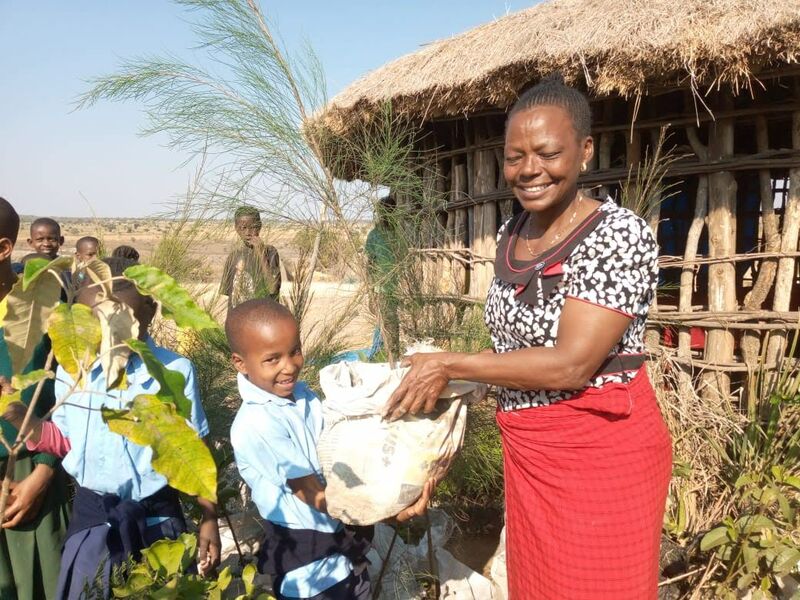Monday the 21st of June was #ShowYourStripes Day, as created by IPCC author, Professor Ed Hawkins of the University of Reading.
Ed is a climate scientist, especially interested in climate variability, predictability and uncertainty. He’s enthusiastic about the public understanding of climate science, especially via famous historical scientists. Ed is the lead scientist for WeatherRescue.org and also a lead author on IPCC AR6 (see footnote).
If you’ve not come across images like the one above, don’t worry, you’re not alone, it’s quite a new initiative but one that I believe everyone should be made aware of. The image above shows the Warming Stripes for Kenya from 1901 to 2020. The coloured lines are visual representations of the changes in temperature as measured over the past 100+ years. Each stripe represents the temperature in Kenya averaged out over a year.
Even without a key to show greater detail of the precise grades of colour and the temperatures they represent, it’s not difficult to comprehend the shift from the more palatable, comfortable and cooler blues to the ridiculously hot deep reds.
Visit the FAQs page on the Show Your Stripes website for more information on Ed’s project. If you hop onto the home page, you’ll see how to download the colour chart for a wide variety of countries; you can even view one for the planet as a whole which reflects data collated from 1850 to 2020. I confess, that’s a pretty distressing chart to ponder.
Ed explains: “The Warming Stripes are a simple and compelling way to visualise that the world is warming and that every country is warming. The graphics can help start local conversations about the increasing risks from climate change wherever you live and the necessary actions to avoid the worst consequences”.

I have to tell you, I could stand up in front of an audience a mile wide and lay out a bunch of valid reasons presented in an engaging way, showing why every corporation and individual needs to pay attention to Ed’s Warming Stripes. I’d go on to explain why we all need to do more to change the way we do business and live, or those stripes are just going to get redder and redder.
Unfortunately, I suspect my mile-wide address would be powerful but nowhere near effective enough to shift everyone into action to help our ailing planet. Let’s face it, if Sir David and every well informed climate scientist (including our own esteemed Special Scientific Advisor, Professor Bill McGuire and Patron, MET Office meteorologist and weather presenter, Clare Nasir) can’t generate enough traction for behaviour change, what chance do I have?
Some days, that depressing fact bites me, other days it feeds my urgency to work harder to find the right words, to connect with the right people, to spark up the right conversations to make the changes we all need to happen.
Global temperatures have increased by more that 1.2°C since 1850.

More and more extreme weather events will continue to affect us all – the question is, what are you doing about it?
If the answer is: ‘Not enough’ then please get in touch with me. I’ll help you make an environmental investment in our small international reforestation charity that will leave a positive legacy for countless future generations.
- Let The Word Forest Organisation plant desperately needed trees in Kenya, on your behalf.
- Let us facilitate permaculture lessons to people living on the frontline of climate change, who desperately need to be more food and water secure.
- Let us build solid stone schools to comfortably educate the people we need to tend those trees to maturity: we need them onside and we owe them a safer future
The Warming Stripes of Kenya hail dire warnings to us all: please heed them and please donate to our charity or become a corporate partner so we can act upon them, together.
You can engage with Professor Hawkins on Twitter @ed_hawkins
Tracey West and The Team
Footnote: More About the IPCC (Intergovernmental Panel on Climate Change) and its Reports
The IPCC is deemed to be the leading global body for the assessment of climate change. It was established in 1988 by the United Nations Environment Programme (UNEP) and the World Meteorological Organization (WMO) It’s remit: ‘To provide the world with a clear scientific review of the current state of knowledge on climate change’. Thousands of scientists from countless countries volunteer their time and energy to compile the reports. They’re selected to review and assess the latest scientific, technical and socio-economic data in order to understand climate change, its potential impacts and options for adaptation and mitigation. The IPCC endeavours to reflect a wide range of views and expertise in order to publish comprehensive, objective assessments.
The AR5, or Fifth Assessment Report was the latest in a set of reports released by the IPCC. It was released in three instalments during 2013/4. In November 2014, an additional Synthesis Report was also published. The IPCC is in the process of preparing AR6, its Sixth Assessment Report. It will contain contributions from each of the three IPCC Working Groups and Synthesis Report too. The Synthesis Report will be the last of the AR6 products, due for release in 2022.





